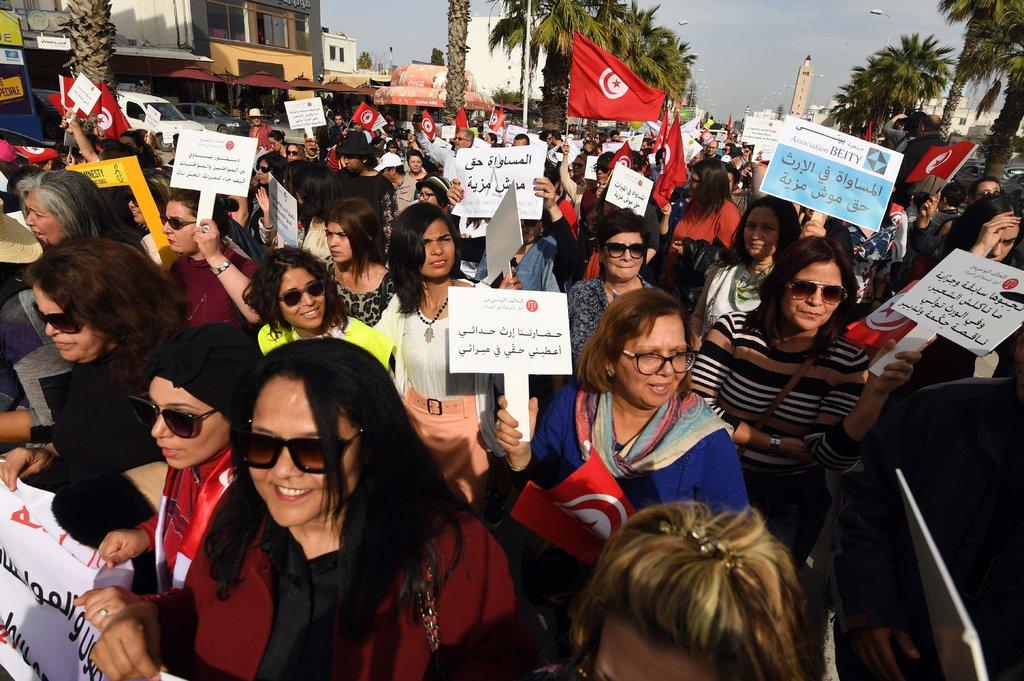
RABAT, Morocco — Last month, Asma Lamrabet, a well-known Moroccan feminist, resigned from her position at the Mohammedan League of Scholars, where she headed a center of women’s studies in Islam. She was pushed to resign, she explained in a statement, by the backlash over her support for a demand that remains controversial in the Arab and Muslim world: an equal share for women.
In Muslim countries, laws governing inheritance are derived from verses in the Quran; men generally receive larger, sometimes double, the shares that women get. Distant male relatives can supersede wives, sisters and daughters, leaving women not just bereaved but also destitute.
Raising the issue of inheritance and inequality has long been considered blasphemous. When Tunisia’s modernizing first president, Habib Bourguiba, did so in 1974, he was targeted by a fatwa from a Saudi cleric and forced to backtrack.
Yet recently, in several North African countries, the debate over equality in inheritance has been picking up steam.
Last summer, President Beji Caid Essebsiof Tunisia created a commission to study how to institute an equitable inheritance law. Recently, a couple of thousand demonstrators gathered in downtown Tunis, the capital, to encourage him to follow through. In Morocco, where I live, the National Council on Human Rights in 2015 recommended instituting equality in inheritance; it was browbeaten by Islamists, but the topic hasn’t gone away.
Last spring, an art gallery in Rabat held an exhibition on the subject and a reformed extremist religious preacher caused an uproar when he supported it on a TV talk show. In the past year, at least three books have been published on the topic. (One of them, edited by a woman, is an anthology of male writers entitled “Men Defend Inheritance Equality.”)
And in January, the Moroccan government took a symbolic but important step: It announced that women would be allowed to become adouls, traditional notaries who witness acts of marriage, divorce and inheritance. Opening this profession to women, Ms. Lamrabet told me at the time, brought women a step closer to equality and to the legal and religious authority from which they have been traditionally excluded across the Muslim Arab world.
Ms. Lamrabet is one of a small group of women who have staked a claim to exercising that authority. “Patriarchy is this: to refuse women authority over religious texts,” she told me. “One of our demands is to accept women’s readings of religious texts and let women be religious authorities.”
I first met Ms. Lamrabet last fall, in her office at the Mohammedan League of Scholars, a stately building decorated with traditional stucco molding, tiles and wooden latticework. The league is Morocco’s pre-eminent official institution of religious scholarship, and Ms. Lamrabet’s presence within it was in and of itself remarkable.
In her many books and public speeches, Ms. Lamrabet argues for a progressive, contextual reading of the Quran. She doesn’t claim, as Islamists do, that Islam already gives women all their rights. She argues that it could, if it was stripped of centuries of misogynist interpretation by male scholars.
When Ms. Lamrabet rejects practices such as polygamy, unequal access to divorce or a husband’s authority over his wife, she either shows there is no textual basis at all in the Quran for these practices, or she argues that the historical context needs to be taken into account when interpreting what the text says.
With regard to inheritance, Ms. Lamrabet and others note that women were allotted a smaller share on the assumption that male relatives would provide for all their material needs. That is no longer the case; many households in Morocco today depend largely on a woman’s income. So Ms. Lamrabet argues that the law should be re-evaluated on the basis of the Quran’s original spirit of justice and fairness.
But apparently making this argument, repeatedly and publicly, was too much for the religious establishment in Morocco.
Ms. Lamrabet says her goal is the “deconstruction of religious patriarchy.” She argues from a religious basis because, she told me, religion is the No. 1 weapon used against women in her country today. She wants to furnish women with arguments with which to reclaim their religion, and to reject inequality and discrimination in the name of Islam.
But she is also critical of the way women’s rights have been deployed by Western powers to justify colonialism, military intervention and attacks on her religion. Her arguments will displease both Muslim conservatives who see feminism as an immoral, unnecessary foreign import and those who believe women’s subjugation is a unique and unchangeable feature of Islam.
Ms. Lamrabet is part of a school of thought often referred to as “Islamic feminism” — which includes the late, great Moroccan sociologist Fatema Mernissi and scholars such as Amina Wadud and Leila Ahmed. She is also part of a larger field of activists, artists and intellectuals trying to articulate a feminist third way — one that doesn’t have to choose between religion and universal rights, between critiquing the West and kowtowing to local conservatives.
The broaching of inheritance reform — which would be a truly revolutionary change — is taking place as a number of Arab countries are giving women new legal rights. In Tunisia, Muslim women will be allowed to marry non-Muslim men (in most Muslim countries only men are allowed to marry outside their religion). Lebanon is the latest country in the region to outlaw the practice of rapists being exonerated for their crime by marrying their victims. Even in Saudi Arabia, the authorities have announced that women will finally be granted the right to drive, as well as to set up their own businesses without a male guardian’s consent.
Skepticism over these announcements is sometimes warranted. Male rulers and autocrats in the region have figured out that branding themselves champions of women’s rights is a winning P.R. move in the West — but even “enlightened” rulers are unlikely to undermine a religious discourse from which they derive much of their own legitimacy. And legal reforms that favor women are only as strong as the rule of law over all. Even as we celebrate every gain that makes women’s lives better, what counts most is the degree to which women are able to voice and to advance their own arguments for equality.
Conservatives would like to simply declare the conversation on inheritance off-limits, but I doubt it is going to fade away. In the same week she resigned, Ms. Lamrabet was one of 102 Moroccan public figures who penned an open letter calling for a reform of inheritance law. The truth is that discrimination against women in the name of Islam is a question to which religious and political authorities today simply have no good answer.
The debate over women’s rights and Islam is so politicized and riddled with stereotypes that it is extremely hard to write about. Muslim women are not all victims, renegades or standard-bearers for religious or cultural authenticity. They are not foils with which to bash Islam or through which sympathetic Westerners can congratulate themselves on their cultural superiority.
True solidarity with women in this part of the world means paying less attention to self-serving male rulers and to cosmetic official initiatives and more to the lively, often contentious debate taking place within Muslim societies, to the diverse voices of women here and to their ideas of how they want to advance their own cause. These voices are secular and religious, young and old; they are also often critical of Western policies in the region.
Inheritance inequality, Ms. Lamrabet told me, is part of an ideology that assumes that women are worth less and deserve less. She and others will continue to insist that women get their fair share.
Ursula Lindsey writes about culture and politics in the Arab world.

